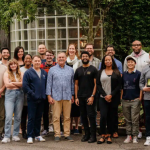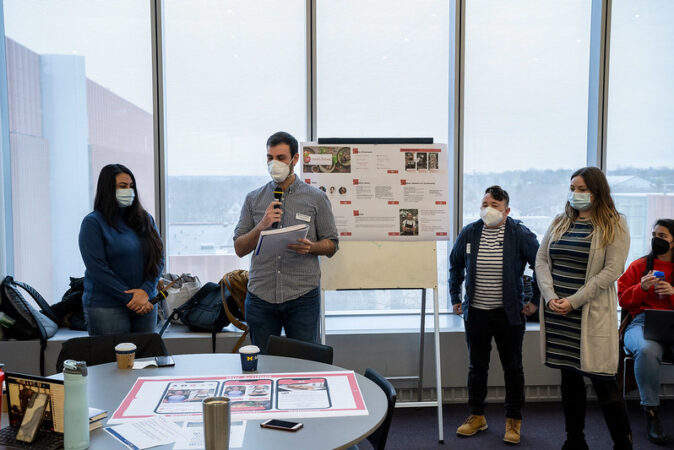With a mission to bring impactful ideas to life that build a sustainable and just world for all, the +Impact Studio opened on the University of Michigan campus as part of the Stephen M. Ross School of Business in 2019. The studio defines impact through the lens of the United Nations Sustainable Development Goals and seeks to create a generation of architects of positive change.
Gilbert & Ruth Whitaker Professor of Management and Faculty Director of Business+Impact at the Michigan Ross School of Business, Jerry Davis affectionately refers to the studio as an “estuary” – a fertile and transitional place that stands between the fresh-water land of ideas and the salt water real world.
“We focus on multidisciplinary, action-based learning within real-world scenarios,” he says.
The intent is to translate insights from students, faculty, and stakeholders into practical solutions for businesses. We work to train students in a set of design tools so that they can essentially help to design the future in which we and generations to come will live.
There are essentially four components of the +Impact Studio and Design Lab, with the organizing structure set up for two co-curricular student experiences: The Applebaum Impact Design Fellowship and the Founders program. Both are funded by the Applebaum Family Philanthropy.
The +Impact Studio Founders program is comparable to an incubator for student-led businesses and ventures that are uniquely focused with priority on concepts centered on diversity, equity, inclusion, racial justice, and climate action.
While the Fellows program involves experienced and interdisciplinary coaches who roll up their sleeves and work alongside founders, bringing business knowledge, design tools, and research expertise to, together, accomplish great things.

STUDENT PRESENTATION
Every Friday the Applebaum Impact Design Fellows work at the Design Lab with student Founders to help bring their ideas to fruition.
The +Impact Studio also offers equity-centered design workshops and development goal-focused workshops that bring together students from across campus with Ross faculty members to share their research and practice design tools and mindsets.
And finally, the interdisciplinary +Impact Studio graduate course prepares students to develop impactful solutions to societal challenges. The course combines the management principles and acumen of business with equity-centered tools and research insights while developing an innovation toolkit to design a just and equitable future.
The course brings students from schools all across the campus to create new business model solutions and ‘How to Guides’ that address climate change and other global issues drawing on the expertise of the university, said Davis.
Every semester forty students, separated into teams, focus on a specific real-world challenge that directly impacts businesses.
The pilot course in 2019 aimed to design solutions to address lead contamination in the Flint water system. The second course focused on fintech. Year three was at the height of COVID, so using equitable design thinking and futuring, business tools, and research insights, the students prototyped new forms of enterprise in an industry undergoing radical change around the globe: restaurants.
The outcomes? Davis points to two great examples.
“Restaurants are the central fabric to any downtown, and COVID was killing them off,” he said. “Our charge was to develop ways to help restaurants thrive and adapt.”
Students put design tools and insights to work to design new models for equitable restaurant enterprises focused on creating good jobs, redistributing power, and positively impacting communities and the environment. They created a set of how to guides for small business owners, and drawing on these, they created prototypes for new kinds of restaurants.
The second course example involving the Flint water crisis evolved into a thriving new business.

BLUE CONDUIT TEAM
Davis says, “This is our original poster child project. The issue in Flint was determining which of the 60,000 houses in the city had underground service lines that had lead contamination. Digging up just one line could cost up to $4000 and the city didn’t have the funds to do that for every house. But fellow Ross Professor Eric Schwartz had an unconventional idea based on the “multi-armed bandit problem,” which has something to do with slot machines. An algorithm exists to determine which slot machines in a casino filled with them have the highest probability of hitting big. Schwartz’s idea was to apply that same thinking and he created a machine-learning algorithm that uses municipal and other data to determine which houses are likely to have lead pipes at a far lower cost than alternative methods.
From this, Blue Conduit emerged, and since 2016 the company has worked with more than 50 municipalities and inventoried over 1.5 million service lines that serve more than 4 million people including partnering with the Biden-Harris
When asked what his future vision for +Impact Studio is, Davis says, “Sometimes I can be a bit like Plankton from SpongeBob SquarePants in that I want to spread information to the world and change the world. So, my dream is to change the way business is taught. To approach business education with design at the center and create architects for future ventures that solve the problems of the world.”
He closes by saying, “I’m deeply passionate and committed to what we are doing here, and I love seeing the University of Michigan – this vessel of ideas – creating impact for businesses and for the people of Michigan and beyond.”
As always, be sure to subscribe to our newsletter for regular updates on all things Detroit.






















